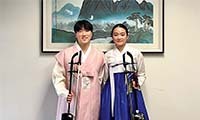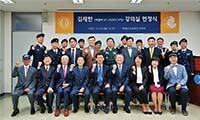The Korean Immigrants Workers Advocate (KIWA) office is made up of several rooms in the office, including a kitchen and office spaces for the staff. The kitchen is known as the "family room", where the staff gathers and eats their meals together.
One would think that because its office is located at 3465 West 8th Street in L.A.’s Koreatown, there would be an abundance of Korean restaurants in which the staff could enjoy meals.
As a matter of fact, there are hundreds of them. However, among these restaurants, KIWA has boycotted many. Thus, KIWA practices what they preach, and have not given business to such restaurants.
The other rooms are office spaces for the staff, a maze of small rooms. The ringing of phones, along with a mixture of different languages all intertwining in the comfortable silence intrigues the ears.
Different colored faces look up from their desks every so often to respond to one another as well as to questions of visitors. As if to build one unified wall, the desks are packed tightly next to one another, solidified not by each desk on its own, but by the connection of all the desks, which are lined up next to one another.
"Here are some informational packets about KIWA," beams Elizabeth Sunwoo, an enthusiastic KIWA staff organizer who is fresh from college but has a resume of an activist veteran.
Most of the staff members are college graduates, some from UC Berkeley, some UCLA, and their staff lawyer is a graduate from Harvard undergrad and Harvard Law, dedicating her life to a non-profit, non-government funded organization.
There are also staff members who are workers at Korean-owned businesses. Regardless of their current jobs, the workers make time to work at least part-time at KIWA.
When asked the question of how the staff manages to work so hard without much stipend, Elizabeth responds very firmly, "You have to be really dedicated." It is without a doubt that the staff is dedicated and works earnestly.
Mrs. Lee, a bright-eyed woman with an eye-crinkling smile has worked at many Koreatown restaurants. Following a series of work-related injuries, including a miscarriage, she sought to gain some sick pay while she was being treated for her injuries.
When her employer did not agree to the sick pay and nearly forced her to work even in bad health, she sought KIWA’s assistance. Now, she consults other workers.
While I was at the KIWA office, she spoke to four or five visitors in the span of three hours.
The staff members are a reflection of KIWA’s mission to be an active voice in justice.
The executive director and founder of KIWA was Roy Hong. He became an activist as a student and had been involved in progressive movements, such as the reunification of North and South Korea, "comfort women" of Korea, as well as international labor movements for Korea and the U.S.
KIWA’s co-founder is Danny Park who also had his beginnings as a student activist. Park is currently the executive director, succeeding Hong who resigned early this year.
The most involved staff organizers are Hoon Jun Kim, Jung Hee Lee (known as Mrs. Lee), Paul Lee, Elizabeth Sunwoo, and Roman Vargas.
Hoon Jun Kim was a student activist in Korea and is the newest addition to KIWA’s staff. Another organizer is Mrs. Lee. As mentioned before, she worked at restaurants in the Koreatown area. After attending several town meetings held by KIWA, she became active within the organization.
Paul Lee is yet another organizer who was a student activist at UCLA and began interning at KIWA during college. A year after KIWA had been established, he graduated UCLA and joined KIWA’s staff. Sunwoo spent her first two years of college working at the North Korea Famine organization on the east coast. She later moved to the west coast and became a student activist at USC.
Roman Vargas is an organizer on staff who had emigrated to the U.S. from Mexico. He was a worker at Korean-owned establishments and attended a seminar, which KIWA was heading up. He became involved shortly after his first encounter with KIWA.
The small KIWA office is nothing short of a powerhouse. Established in March of 1992, KIWA has helped immigrant workers of all ethnicities have a voice.
After the 1992 Los Angeles riots, when the Korean American Relief Fund (KARF) excluded worker victims as eligible for the relief fund, KIWA along with forty-five Latino and Korean workers contested this eligibility. As a result, the workers gained $109,000 from the relief fund.
Five years later, KIWA would assist garment workers to win more than $2 million from retailers and manufacturers of the infamous El Monte "slave shops". KIWA has tackled several industries, such as the garment, janitorial, electronic, and in particular, the restaurant industry.
KIWA started the Restaurant Workers Justice Campaign in 1996 to protect immigrant workers employed at Koreatown restaurants. According to KIWA’s records, there is an existing 280 + Korean-run restaurants in the Koreatown vicinity. During a random check, the U.S. Department of Labor discovered over 95% of Koreatown restaurants violated the labor laws. To further support workers at such unlawful establishments, KIWA has developed a Worker Empowerment Clinic to assist workers with legal services that they would, otherwise, have no access to.
One of KIWA’s latest achievements was the settlement of a lawsuit against Elephant Snack Corner Restaurant in Koreatown, which was brought by its former employees one year ago.
In an unprecedented settlement, the employer agreed to pay an undisclosed sum in compensation, as well as to participate in procedures to ensure that the restaurant complies with labor laws.
The employer agreed to a three-year monitoring scheme, where KIWA and MALDEF will hold labor law seminars for current employees and monitor payroll practices for three years. The wage dispute has been the subject of weekly community protests since April 2000.
KIWA, a non-government funded and non-profit organization, is on the forefront of change. Apart from the Koreatown Restaurant Workers Justice Campaign and Worker Empowerment Clinic, KIWA is leading up many other different projects, such as the Voter Awareness, the North Korean Famine Relief Support, the International Labor Movement Support, the Garment Workers Advocacy, the Summer Activist Training, and Police Accountability.
"Warriors" is the only word that comes to mind about KIWA. During a restaurant boycott in 1998, Roy Hong participated in a hunger strike for nine days, not even taking food on Christmas day.
Passionate and Driven they desire change in a community that has remained silent for so long, willing to fight in an uphill battle.
The KIWA mission statement states: "[it is our mission] to empower Korean immigrant workers and to develop a progressive constituency and leadership in the Korean community that can struggle in solidarity with other underrepresented communities for social change and justice."
By the way KIWA is serving the community of immigrant workers, "social change and justice" will not be too far away.
스마터리빙
more [ 건강]
[ 건강]이제 혈관 건강도 챙기자!
[현대해운]우리 눈에 보이지 않기 때문에 혈관 건강을 챙기는 것은 결코 쉽지 않은데요. 여러분은 혈관 건강을 유지하기 위해 어떤 노력을 하시나요?
 [ 건강]
[ 건강]내 몸이 건강해지는 과일궁합
 [ 라이프]
[ 라이프]벌레야 물럿거라! 천연 해충제 만들기
 [ 건강]
[ 건강]혈압 낮추는데 좋은 식품
[현대해운]혈관 건강은 주로 노화가 진행되면서 지켜야 할 문제라고 인식되어 왔습니다. 최근 생활 패턴과 식생활의 변화로 혈관의 노화 진행이 빨라지고
사람·사람들
more많이 본 기사
- [‘로드 레이지’ 한인 피살 현장 상세 상황] 끼어들기 시비가 비극으로… 차에서 내려 “쏴봐라” 언쟁
- [이민 단속] 여권 소지 시민권자들 … 1
- [이민 단속] 새해에도 더 공격적 단속
- [성탄절 문 여는 곳은] 코스코·월마트 닫고… CVS는 영업
- 크리스마스 대형 폭풍… 침수·산사태 대비 ‘비상’
- 취업비자(H-1B), 고연봉자 우선 발급
- 연방대법, 시카고 주방위군 투입 ‘기각’
- 가난해서 흙 팠는데… ‘다이아’ 캤다
- MC몽, 차가원 회장 충격 불륜 부인.. “채무 120억 당연히 이행”
- 두 손 모아 성탄기도… “온 세상에 평화를”
- ‘마약 혐의’ 남양유업 창업주 외손녀 황하나 경찰에 체포
- 트럼프 “마두로 물러나라” 최후통첩
- 엡스타인 자료 추가 공개… “전용기에 트럼프 8번 타”
- 정동원, 내년 2월 23일 해병대 입대..전역 예정일은 27년 8월 22일
- 차기 대선 선호도… 공화 ‘밴스’ ·민주 ‘뉴섬’ 선두
- 불체자 자진출국하면 지원금 3배로 ‘3천불’
- ‘파워볼’ 열풍 계속… 오늘 잭팟상금 17억 달러
- 트럼프의 새 독트린 “미국을 다시 왜소하게”
- “ATM기 사용하기 겁나네”
- 온라인쇼핑과 반품, 그리고 그 이후
- 미 해군 군함 명칭 전통 깬 ‘트럼프급 전함’
- [미국은 지금] MAGA의 분열, 예견된 균열의 시작
- 한국외대, ‘김재한 강의실’ 헌정식
- “은·로빈후드·인공지능 주식에 집중 투자”
- 퀸, 51년 전 ‘미발표곡’ 공개 녹음 뒤 앨범에 안 담긴 곡
- 해외서도 극과극 반응’대홍수’, 넷플릭스 글로벌 1위 차지”SF 걸작 vs 최악”
- 내년 OC서 첫 이사회 및 신년회
- 잇단 트럼프 때리기에도…파월, 지지율 3부 요인중 최고
- 지평 넓히는 K-푸드… 라면·김치 이어 과자·스낵 가세
- ICE 홈디포 급습 한인 체포
- ‘글루텐 불내증’ 셰프가 빵집을? 고객 향한 온기 담은 바게트
- “트럼프 정부, 망명신청자 8천명 과테말라 등 제3국 추방 추진”
- “경쟁력ㆍ맞춤형 금융 솔루션 제공”
- MD 로우스 직원, 지게차로 70대 노인 살해
- SD 해군장병들 받을 보너스 2억여 달러 지역 경제 도움
- [남가주 6개 은행 전국 예금 현황] 1억달러 이상 예금고 지점 99개
- 먹는 비만약 경쟁 치열 ‘위고비’ 미국 판매승인
- 발렌시아 한국학교 한국어 스펠링비 성료
- 올해 워싱턴DC 식당 92곳 폐업…‘역대 최다’
- [수요 에세이] 삶이라는 배를 타고
- 한미가정상담소 미술심리 힐링
- “샌디에고와 100점짜리 계약 체결… 마차도와 호흡 기대”
- 이하늬, 기획사 미등록 혐의 검찰 송치.. “10월 정식 등록”
- 뚜레쥬르, 뉴욕 맨해튼에 직영 ‘매디슨 스퀘어 파크점’ 열어
- 금값, 1979년 이후 최대 연간 상승
- ‘세계한인대회’ 신설한다 한인회·한상·차세대 포괄
- [지평선] ‘인간GPT’ 환각의 부작용
- 한국계 타자 레프스나이더 시애틀과 625만달러 1년 계약
- [송년 행사] KAMA USA 실버모델협회
- ‘100억달러 수주’ 한화오션, 내년 FPSO 시장 노린다
1/5지식톡

-
 미 육군 사관학교 West Poin…
0
미 육군 사관학교 West Poin…
0https://youtu.be/SxD8cEhNV6Q연락처:wpkapca@gmail.comJohn Choi: 714-716-6414West Point 합격증을 받으셨나요?미 육군사관학교 West Point 학부모 모…
-
 ☝️해외에서도 가능한 한국어 선생님…
0
☝️해외에서도 가능한 한국어 선생님…
0이 영상 하나면 충분합니다!♥️상담신청문의♥️☝️ 문의 폭주로 '선착순 상담'만 진행합니다.☎️ : 02-6213-9094✨카카오톡ID : @GOODEDU77 (@골뱅이 꼭 붙여주셔야합니다…
-
 테슬라 자동차 시트커버 장착
0
테슬라 자동차 시트커버 장착
0테슬라 시트커버, 사놓고 아직 못 씌우셨죠?장착이 생각보다 쉽지 않습니다.20년 경력 전문가에게 맡기세요 — 깔끔하고 딱 맞게 장착해드립니다!장착비용:앞좌석: $40뒷좌석: $60앞·뒷좌석 …
-
 식당용 부탄가스
0
식당용 부탄가스
0식당용 부탄가스 홀세일 합니다 로스앤젤레스 다운타운 픽업 가능 안녕 하세요?강아지 & 고양이 모든 애완동물 / 반려동물 식품 & 모든 애완동물/반려동물 관련 제품들 전문적으로 홀세일/취급하는 회사 입니다 100% …
-
 ACSL 국제 컴퓨터 과학 대회, …
0
ACSL 국제 컴퓨터 과학 대회, …
0웹사이트 : www.eduspot.co.kr 카카오톡 상담하기 : https://pf.kakao.com/_BEQWxb블로그 : https://blog.naver.com/eduspotmain안녕하세요, 에듀스팟입니다…
케이타운 1번가
오피니언
 정숙희 논설위원
정숙희 논설위원온라인쇼핑과 반품, 그리고 그 이후
 파리드 자카리아 / 워싱턴포스트 칼럼니스트 / CNN ‘GPS’ 호스트
파리드 자카리아 / 워싱턴포스트 칼럼니스트 / CNN ‘GPS’ 호스트 트럼프의 새 독트린 “미국을 다시 왜소하게”
 김동찬 시민참여센터 대표
김동찬 시민참여센터 대표 [미국은 지금] MAGA의 분열, 예견된 균열의 시작
 임지영 (주)즐거운 예감 한점 갤러리 대표
임지영 (주)즐거운 예감 한점 갤러리 대표 [수요 에세이] 삶이라는 배를 타고
 이영창 / 한국일보 기자
이영창 / 한국일보 기자[지평선] ‘인간GPT’ 환각의 부작용
 조환동 / 편집기획국장·경제부장
조환동 / 편집기획국장·경제부장 AI로 가속화되는 노동시장 개편
 민경훈 논설위원
민경훈 논설위원‘크리스마스 캐롤’과 산타 클로스
 정재민 KAIST 문술미래전략 대학원 교수
정재민 KAIST 문술미래전략 대학원 교수 [정재민의 미디어풍경] 적과의 동침, 협력하며 경쟁하기
 김영화 수필가
김영화 수필가 [화요칼럼] 단호박의 온기
1/3지사별 뉴스

‘연방하원 도전장’ 척 박 예비후보 후원모임
연방하원에 도전장을 낸 척 박(한국명 박영철) 예비후보 후원 모임이 지난 18일 열렸다. 척 박의 부친인 박윤용 뉴욕주하원 25선거구 (민주)…
‘경찰 무력사용지침 갱신 의무화’ 입법 초읽기

‘올해는 ICE 이민자 체포 광풍의 해’
올 한해동안 버지니아와 메릴랜드, DC 등에서 연방 이민당국에 체포된 사람이 1만명이 훌쩍 넘는 것으로 조사됐다. 또 미 전국적으로는 22만명…
“ATM기 사용하기 겁나네”

연말 ‘로드레이지’ 비극… 한인 총격 피살
연말을 맞아 도로 위에서 순간적으로 벌어진 운전 중 시비가 40대 한인 가장의 총격 피살 비극으로 이어졌다. 워싱턴주 레이시 경찰국과 서스턴 …
엡스타인 파일 공개 다음날 트럼프 사진 삭제…야당서 탄핵 경고

오늘 하루 이 창 열지 않음 닫기 





















































.png)


댓글 안에 당신의 성숙함도 담아 주세요.
'오늘의 한마디'는 기사에 대하여 자신의 생각을 말하고 남의 생각을 들으며 서로 다양한 의견을 나누는 공간입니다. 그러나 간혹 불건전한 내용을 올리시는 분들이 계셔서 건전한 인터넷문화 정착을 위해 아래와 같은 운영원칙을 적용합니다.
자체 모니터링을 통해 아래에 해당하는 내용이 포함된 댓글이 발견되면 예고없이 삭제 조치를 하겠습니다.
불건전한 댓글을 올리거나, 이름에 비속어 및 상대방의 불쾌감을 주는 단어를 사용, 유명인 또는 특정 일반인을 사칭하는 경우 이용에 대한 차단 제재를 받을 수 있습니다. 차단될 경우, 일주일간 댓글을 달수 없게 됩니다.
명예훼손, 개인정보 유출, 욕설 등 법률에 위반되는 댓글은 관계 법령에 의거 민형사상 처벌을 받을 수 있으니 이용에 주의를 부탁드립니다.
Close
x